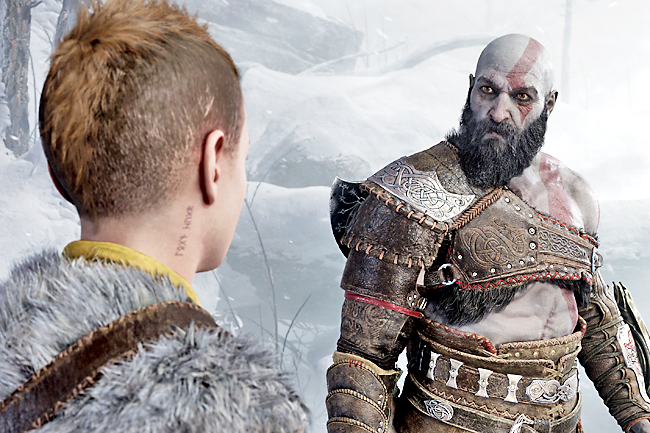Gene Park
THE WASHINGTON POST – The God of War series has become the PlayStation’s improbable marquee series. It’s improbable because one might assume its extreme violence wouldn’t have mass market appeal.
What does have mass appeal, however, is the tragic story of Kratos. His anger, power-hungry madness and eventual deep regret have resonated with millions of players since 2005.
The original trilogy on PlayStation 2 and 3 best crystallised the angry, edgy, young adult masculinity of the early 2000s era of video games. But in 2018, God of War for PlayStation 4 performed the rare feat of rebooting the series while continuing its narrative, reaching an even bigger audience. That game sold 23 million copies, putting the series at the top of the Sony first-party food chain (if you don’t count Marvel’s Spider-Man). That’s an impressive feat for a game and story about family that isn’t exactly family friendly.
The game design pillars of the series have been spectacle, combat and puzzle solving. This remains true even in the 2018 game and its sequel, God of War Ragnarok. However, the modern series places a much greater emphasis on emotional depth and cinematic storytelling, while still trying to achieve that sense of grand, violent spectacle.
There’s not a stinker in the series. Even the worst God of War game is a great time with plenty of reasons to love it. And the best games all have strong arguments to be considered the best in the series. The following list ranks the mainline console games and the PlayStation Portable handheld titles – eight God of War games in total.

8. God of War: Chains of Olympus (2008)
The PlayStation Portable device was notable for bringing PlayStation 2 console-quality imagery and gameplay to a pocket-size device. This entry, created by Ready at Dawn Studios only added to the shock of high-fidelity mobile gaming.
God of War: Chains of Olympus almost matches the original 2005 release in size and spectacle, though it’s hampered by an awkward control scheme, resulting from squeezing the game onto a device with fewer buttons. The game’s puzzles and combat lose much of their challenge due to this constraint. Really, the game’s biggest flaw is that it was born into a mobile gaming ecosystem that had yet to mature into today’s golden era of fully-functional handheld devices, like the Nintendo Switch and Valve Steam Deck.
7. God of War (2005)
It’s a credit to the rest of the games on this list that they were able to iterate so successfully on this astonishing debut. The first God of War game was a bold fusion of its two main inspirations: combat from Hideki Kamiya’s Devil May Cry series and the platforming and cinematography of Fumito Ueda’s PlayStation 2 epic Ico. This was among the earliest examples of Sony exclusive games tapping into a console’s full potential. The PlayStation 2 was the weakest of its generation, but this entry, directed by David Scoff Jaffe, was the strongest flex of Sony’s knack for high-fidelity gaming, displaying at a 480p resolution which was rare for any console game in 2005.
The game’s combat mechanics were nearly perfect from the start, and remained largely untouched until the 2018 PlayStation 4 reboot, and even that game is tied to the rhythms established back in 2005. The story was remarkable in its scope and scale, the Ico influence seen in towering level designs like the temple on the back of the Titan Cronos. The only reason this first entry is so low is because its puzzle and platforming designs were infuriating.
Anyone who played this game was likely traumatised by the balance beam blade sequence as Kratos escaped from the Underworld. Its reliance on box-pushing puzzles is a relic of the early 2000s experiments into 3D video games, popularised by the Tomb Raider series.
6. God of War: Ghost of Sparta (2010)
In terms of story, this is more of a sequel to the first game than the actual sequel. This second PSP entry centres on Kratos’s brother Deimos and how he was initially thought to bring about the destruction of Mt Olympus. Again developed by Ready at Dawn Studios, this is just a better, more streamlined experience than the first PSP title – and even the first game. It also has a far more interesting locale in Atlantis, full of life at the beginning and burning and sinking into the ocean just moments after Kratos touches down. Despite being released the same year as the stunning and gorgeous PlayStation 3 entry, this game is probably best experienced in its narrative order right after the 2005 debut. It’s how I played it, and it’s likely why I rank it higher than the first game.
This was also the first game in which series fatigue started to set in – especially considering the bombast of the PlayStation 3’s closing chapter. Still, Kratos gets a spear, and it’s probably his best weapon of the series outside of his iconic Blades of Chaos and the Leviathan Ax of the PS4 and PS5 titles.
5. God of War: Ascension (2013)
While the formula’s fatigue started to set in with Ghost of Sparta, this is the game that confirmed the feeling for many players. Landing three years after the story of the Greek pantheon ended, Ascension felt redundant upon release.
But looking back, this game probably houses the most ambitious, bold and awe-inspiring level design of the series. The beginning temple is built into the body of Aegaeon the Hecatonchires, a giant with 50 heads and 100 arms. The architecture shifts as you battle with the giant, a sight as glorious and breathtaking as any in the series. Ascension has a bad rap, compounded by its inclusion of an unnecessary multiplayer component, a symptom of that console generation’s tendency to shoehorn multiplayer features into games that don’t need them. But after fatigue comes rest, and in hindsight it’s clear that Ascension was Santa Monica Studio experimenting with the formula as one last hurrah before it would go into deep hibernation and reboot the series completely.
4. God of War 3 (2010)
The first 30 minutes of God of War 3 are to this day among the most extraordinary in any video game. Even someone with zero interest in video games can appreciate a Titan punching Poseidon’s godly form, flinging Kratos into and through its watery body to drag the god out and into a more equal playing field. The ensuing murder of Poseidon, and the resulting floods throughout the Greek world, set the stakes.
The game was ludicrous in its attempt to outdo the previous games. This is the game that contributed most to the series fatigue, but only because it thrashed against any and all limits when constructing its monsters and play areas. Kratos climbs from the Underworld all the way to the top of Mt Olympus for the final showdown with Zeus, all while blowing up an entire rogues gallery of Greek gods. No kill is quite as memorable as Poseidon’s, but that’s not for lack of trying. The death of Helios is a particularly gory memory. It’s the memories Kratos makes here that traumatise him later in life. Poor Kratos! But lucky for us that we got to embody his irresponsible madness with little consequence, besides getting a bit bored with the series. The next major title, and the next game on this list, would fix that.
3. God of War (2018)
2018’s God of War is the rare game in a long-running series that revitalises and rejuvenates, bringing newfound relevance to an old character. Cory Barlog, series director since the second game and a lead animator in the first game, had to fight hard to keep the story about Kratos and his growth since his famous three- to five-game murder rampage. He was right to trust his instincts in making Kratos a father, inspired by the success of Sony stablemate Naughty Dog’s The Last of Us.
The story is refreshingly small in scale, despite the DNA of the series: Kratos, along with his son Atreus, fulfill his wife’s final request to scatter her ashes across the tallest peak in the nine realms of Norse mythology. Against their will, they are forced into conflict with the local gods. Kratos now realises his actions throughout the entire original trilogy amounted to nothing, and he desperately wants to avoid exposing his son to such depravity.
Despite being a funeral march Kratos’ adventure with his son plumbs the consequences of toxic masculinity and absent fatherhood, and the work it takes to repair a broken relationship.
The novelty of the transition from the original trilogy to the reboot has faded since the 2018 game’s release, but that doesn’t take anything away from its improbable success. Among the PlayStation 4’s incredible archive of exclusive titles, this God of War is among the easiest to recommend to almost anyone.
2. God of War 2 (2007)
No other game set the stakes higher than this one. While cliffhangers are tricky to get right, Cory Barlog’s directorial debut lays claim to having the most tantalising cliffhanger ever written in the medium. It starts with Kratos, a small but mighty god, being betrayed by Zeus, and ends with him literally cutting the threads of fate that bind him so he could ride a Titan as he declares war on the Greek gods. Barlog starting out as an animator on this series is telling: Kratos’ movement distinguishes him from other action game protagonists, even as it wears its inspirations, Capcom’s Devil May Cry and Street Fighter series, on its sleeve.
It’s that fighting game mentality that locks in how tight fights feel. The game has an innate understanding of spectacle that contributes to this sense that Barlog isn’t just animating Kratos, he’s animating the entire world – and its destruction – around him. There’s a sharper focus on cinematic action, and this time, the Santa Monica Studio team has full command of the PlayStation 2’s capabilities. This second game is often called the swan song of the PlayStation 2, history’s best-selling gaming console.
1. God of War Ragnarok (2022)
Is it recency bias? Is it too early to declare this new game the best in the series? Perhaps, but once you play it, it’s hard to argue against its strengths, and how much it recalls the past trilogy while accentuating its best qualities. The improvements from 2018 are easy to spot, and the largest combat encounters rival the sequences found in the bombastic second and third games. Giant enemies fill the screen – and this time there are several emotional layers to each fight, due to Kratos’ reluctance to participate. This added tension makes every fight in this game just a bit more exciting than any other in the series.
Ragnarok also boasts the best puzzles in the series, working mostly with logic and lines of sight instead of the hide-and-seek frivolities of the 2018 title’s puzzles, or the rote block-and-lever puzzles of the first games. The fighting is the best ever in the series, mixing the perspective of the 2018 prequel while recalling the glory days of Sparta with a brand new moveset that will delight longtime players. And while the story has some pacing issues in its first several hours, it resolves as the most rewarding and hopeful ever seen in the series. Zeus was an easy villain to hate; the Norse All-Father Odin brings a new kind of seductive menace to the proceedings.
Instead of a cliffhanger like in the previous games, we are instead left with a sense of loss hanging over us. Ragnarok is a heartbreaking yet life-affirming triumph.







